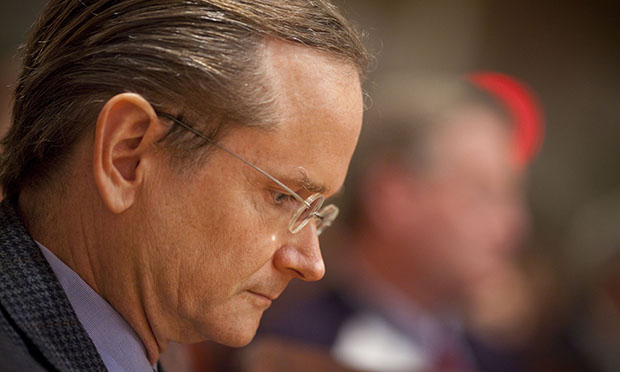Can Harvard's Lawrence Lessig Trounce The New York Times?
No doubt, he's making vital points about press tactics in the Digital Age, but one wonders where his lawsuit is taking his life and career.
January 31, 2020 at 12:42 PM
6 minute read
 Lawrence Lessig. (Courtesy photo)
Lawrence Lessig. (Courtesy photo)
When I saw the news about Lawrence Lessig's defamation lawsuit against The New York Times, I thought, "Lordy, another Harvard Law professor with a bruised ego." (Granted, I might have been lumping all Harvard profs with Alan Dershowitz, who seems to embody the infinite ego of that august institution.)
 But as I read Lessig's complaint, talked with him and others, I became more much sympathetic to his plight. No doubt, he's making vital points about press tactics in the Digital Age, and how truth gets distorted, if not trampled. That said, I have to wonder where his lawsuit against the Times is taking his life and career.
But as I read Lessig's complaint, talked with him and others, I became more much sympathetic to his plight. No doubt, he's making vital points about press tactics in the Digital Age, and how truth gets distorted, if not trampled. That said, I have to wonder where his lawsuit against the Times is taking his life and career.
The backstory is this: On Sept. 14, the Times published a story with this headline: "A Harvard Professor Doubles Down: If You Take Epstein's Money, Do It in Secret." Mostly a Q&A, the lede reads: "It is hard to defend soliciting donations from the convicted sex offender Jeffrey Epstein. But Lawrence Lessig, a Harvard Law professor, has been trying."
Lessig described the Times' headline and the lede as "sensationalized, false and defamatory 'clickbait'" in his complaint, designed "to drive readers to their story and website." He also claims that he raised his objections to the reporter during the fact-checking stage and that the reporter agreed that "the incorrect language of her draft article would be corrected." And after the story was published, he made additional requests for corrections that the Times rebuffed.
(Asked for comment, the Times responded: "When Professor Lessig contacted The Times to complain about the story, senior editors reviewed his complaint and were satisfied that the story accurately reflected his statements. We plan to defend against the claim vigorously.")
The Times story was precipitated by Lessig's own 3,500-word post in Medium in which he defended his friend Joichi Ito, who, as head of the MIT Media Lab, accepted donations from Epstein. After the New Yorker exposed the MIT/Epstein connection, Ito was pushed out.
Though Lessig's main point was that Ito was scapegoated and that prestigious institutions often get money from unsavory sources, he also wrote about his deep regret that he didn't do more to dissuade Ito from taking Epstein's money: "I am ashamed that I did not let him see just how hurtful it was to imagine slime like Epstein living within the walls of MIT, even if hidden by promises of anonymity."
But the Times' headline skipped Lessig's anguish and made him look like an unrepentant apologist for sordid money. The effect is misleading and hurtful, but is a lawsuit the only recourse?
Lessig says yes. "I love the Times; it was a terribly hard decision for me," he told me over the phone. "But it's not possible for me to let this lie. I've got to fight it." He adds: "This will be long, expensive and painful." (He's being represented by Howard Cooper in Boston.)
As a well-known law professor active in social media, Lessig would be considered a "limited" public figure, subject to a higher standard to make his case, says Fordham Law School professor Ben Zipursky. "That means the Times will win the case unless he can prove actual malice—meaning actual knowledge that it's false and reckless disregard for the truth," Zipursky explains.
Sounds daunting. So is this worth the effort? Is he taking it too personally?
"No, it's professional," Lessig insists. "Put yourself in the position of a woman sitting in my class who's thinking she has a professor who justifies taking money from Jeff Epstein. How can she connect with me? And for women who have been abused, it'd be especially painful."
Zipursky and other defamation experts are torn about his chances of winning.
"My take is that it's almost impossible for him to win," says Dori Hanswirth, a partner at Arnold & Porter's media and entertainment group. "He doesn't allege the article is false but that the headline doesn't reflect the truth or the conversation he had with Nellie Bowles [the Times reporter]."
Another problem is that "he would have to prove damages as a result of the Times headline," Hanswirth says. "He'd have to prove the state of his reputation before the Times article was published, and he already had lots of criticism because of his Medium essay."
Zipursky, however, thinks Lessig has a shot. "I don't think the headline is false, but I think he has a powerful argument with the lede," Zipursky says. "If you look at what he said in the Times interview and what he wrote online, it's clear that his position was that it's wrong and indefensible to take Epstein's money. When [the Times] was fact-checking, he told them they got it wrong, but they didn't correct it, which goes to establishing actual malice."
Another factor is that Lessig himself was a victim of sexual abuse as a child, something he alludes to in his Medium essay and has talked openly about in the past. "The fact that he's torn apart by this issue because of his experience might make a difference," Zipursky adds.
Still, the hurdle for Lessig is high. "If you use figurative or hyperbolic language, courts will give the press leeway to allow people the space to make different interpretations," Zipursky explains. "The Times can put out a good argument, but it's still up to the judge."
For now, Lessig is charging forward. And an apology from the Times is not what he's looking for. "In the internet era, stories are perpetual. If they just corrected the headline and lede, I would be happy."
Such a simple request. But what a tall order.
Related post: Boies and Pottinger Open Up About That New York Times Article
Contact Vivia Chen at [email protected]. On Twitter: @lawcareerist.
This content has been archived. It is available through our partners, LexisNexis® and Bloomberg Law.
To view this content, please continue to their sites.
Not a Lexis Subscriber?
Subscribe Now
Not a Bloomberg Law Subscriber?
Subscribe Now
NOT FOR REPRINT
© 2025 ALM Global, LLC, All Rights Reserved. Request academic re-use from www.copyright.com. All other uses, submit a request to [email protected]. For more information visit Asset & Logo Licensing.
You Might Like
View All
Change Is Coming With the New Trump Era. For Big Law, Change Is Already Here
6 minute read


Letter From London: 5 Predictions for Big Law in 2025, Plus 5 More Risky Ones
6 minute readTrending Stories
- 1We the People?
- 2New York-Based Skadden Team Joins White & Case Group in Mexico City for Citigroup Demerger
- 3No Two Wildfires Alike: Lawyers Take Different Legal Strategies in California
- 4Poop-Themed Dog Toy OK as Parody, but Still Tarnished Jack Daniel’s Brand, Court Says
- 5Meet the New President of NY's Association of Trial Court Jurists
Who Got The Work
J. Brugh Lower of Gibbons has entered an appearance for industrial equipment supplier Devco Corporation in a pending trademark infringement lawsuit. The suit, accusing the defendant of selling knock-off Graco products, was filed Dec. 18 in New Jersey District Court by Rivkin Radler on behalf of Graco Inc. and Graco Minnesota. The case, assigned to U.S. District Judge Zahid N. Quraishi, is 3:24-cv-11294, Graco Inc. et al v. Devco Corporation.
Who Got The Work
Rebecca Maller-Stein and Kent A. Yalowitz of Arnold & Porter Kaye Scholer have entered their appearances for Hanaco Venture Capital and its executives, Lior Prosor and David Frankel, in a pending securities lawsuit. The action, filed on Dec. 24 in New York Southern District Court by Zell, Aron & Co. on behalf of Goldeneye Advisors, accuses the defendants of negligently and fraudulently managing the plaintiff's $1 million investment. The case, assigned to U.S. District Judge Vernon S. Broderick, is 1:24-cv-09918, Goldeneye Advisors, LLC v. Hanaco Venture Capital, Ltd. et al.
Who Got The Work
Attorneys from A&O Shearman has stepped in as defense counsel for Toronto-Dominion Bank and other defendants in a pending securities class action. The suit, filed Dec. 11 in New York Southern District Court by Bleichmar Fonti & Auld, accuses the defendants of concealing the bank's 'pervasive' deficiencies in regards to its compliance with the Bank Secrecy Act and the quality of its anti-money laundering controls. The case, assigned to U.S. District Judge Arun Subramanian, is 1:24-cv-09445, Gonzalez v. The Toronto-Dominion Bank et al.
Who Got The Work
Crown Castle International, a Pennsylvania company providing shared communications infrastructure, has turned to Luke D. Wolf of Gordon Rees Scully Mansukhani to fend off a pending breach-of-contract lawsuit. The court action, filed Nov. 25 in Michigan Eastern District Court by Hooper Hathaway PC on behalf of The Town Residences LLC, accuses Crown Castle of failing to transfer approximately $30,000 in utility payments from T-Mobile in breach of a roof-top lease and assignment agreement. The case, assigned to U.S. District Judge Susan K. Declercq, is 2:24-cv-13131, The Town Residences LLC v. T-Mobile US, Inc. et al.
Who Got The Work
Wilfred P. Coronato and Daniel M. Schwartz of McCarter & English have stepped in as defense counsel to Electrolux Home Products Inc. in a pending product liability lawsuit. The court action, filed Nov. 26 in New York Eastern District Court by Poulos Lopiccolo PC and Nagel Rice LLP on behalf of David Stern, alleges that the defendant's refrigerators’ drawers and shelving repeatedly break and fall apart within months after purchase. The case, assigned to U.S. District Judge Joan M. Azrack, is 2:24-cv-08204, Stern v. Electrolux Home Products, Inc.
Featured Firms
Law Offices of Gary Martin Hays & Associates, P.C.
(470) 294-1674
Law Offices of Mark E. Salomone
(857) 444-6468
Smith & Hassler
(713) 739-1250










